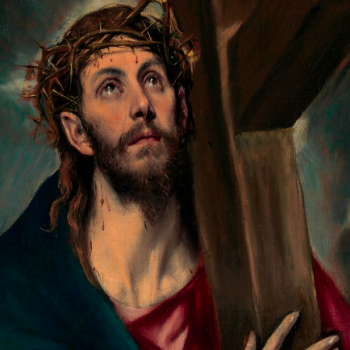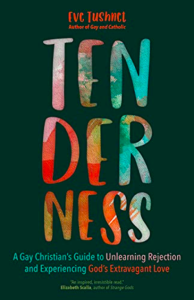Palm Sunday
The beginning of Christendom is, strictly, at a point out of time. A metaphysical trigonometry finds it among the spiritual Secrets, at the meeting of two heavenward lines, one drawn from Bethany along the Ascent of Messias, the other from Jerusalem against the Descent of the Paraclete. That measurement, the measurement of eternity in operation, of the bright cloud and the rushing wind, is, in effect, theology.
—Charles Williams, The Descent of the Dove
Fig Monday
Be adored among men,
God, three-numberèd form;
Wring thy rebel, dogged in den,
Man’s malice, with wrecking and storm.
Beyond saying sweet, past telling of tongue,
Thou art lightning and love, I found it, a winter and warm;
Father and fondler of heart thou hast wrung:
Hast thy dark descending and most art merciful then.
—Gerard Manley Hopkins, The Wreck of the Deutschland I.9
Temple Tuesday
Forgive us, O Lord, we acknowledge ourselves as type of the common man,
Of the men and women who shut the door and sit by the fire;
Who fear the blessing of God, the loneliness of the night of God, the surrender required, the deprivation inflicted;
Who fear the injustice of men less than the justice of God;
Who fear the hand at the window, the fire in the thatch, the fist in the tavern, the push into the canal,
Less than we fear the love of God.
We acknowledge our trespass, our weakness, our fault; we acknowledge
That the sin of the world is upon our heads; that the blood of the martyrs and the agony of the saints
Is upon our heads.
Lord, have mercy upon us.
Christ, have mercy upon us.
Lord, have mercy upon us.
—T. S. Eliot, Murder In the Cathedral
Spy Wednesday
For Christ Himself is ground of all the laws of Christian men, and He taught us to do good against ill: here may we see that He is Himself this charity, and doeth to us as He teacheth us to do. For He willeth that we be like Him in wholeness of endless love to ourself and to our even-Christians: no more than His love is broken to us for our sin, no more willeth He that our love be broken to ourself and to our even-Christians: but endlessly hate the sin and endlessly love the soul, as God loveth it.
—Dame Julian of Norwich, The Revelation of Divine Love, Thirteenth Shewing, Ch. 40
Maundy Thursday
When we reflect on what the body means for us, we will notice that it carries within it a certain contradiction. On the one hand, the body is the boundary that separates us from others. Where this body is, no other body can be. … We cannot look inside the other person; corporeal existence hides his inner self; on that account, indeed, we are strangers even to ourselves. … But there is a second thing: The body is also a bridge. For we meet each other through the body; through it we communicate in the common material of creation; through it we can see ourselves, feel ourselves, come close to one another. … And on that basis we can understand that Jesus, in the speech about the Eucharist that John has handed down to us, puts the Resurrection and the Eucharist together and that the Fathers say that the Eucharist is the medicine of immortality. Receiving Communion means entering into communion with Jesus Christ; it signifies moving into the open through him who alone could overcome the limits and thus, with him and on the basis of his existence, becoming capable of resurrection oneself.
—Pope Benedict XVI, God Is Near Us: The Eucharist, the Heart of Life, “The Presence of the Lord in the Sacrament”
Good Friday
High in the noonday sky,
His arms thrown open wide,
Love is about to die,
With a thief on either side.
His mother, calm in pain,
Adoring, and John,
The youngest friend, remain:
Fair weather friendships gone.
And one other. She
Whose sins have had their share
In blossoming that tree,
Offers her sorrow there.
And so triumphant grief
Makes her the fourth to stay:
Two innocents, a thief
And a whore, together pray.
—Dunstan Thompson, Magdalen V.1-4, 17-24, 33-36
Holy Saturday
But, Madam, you who willingly sacrific’d yourselfe to God, in yr obedience to him, in yr own sicknes, cannot be doubted to dispute wt him, about any part of you, wch he shall be pleased to requier at yr hands. The difference ys great, in the losse of an arme, or a Head; of a child, or a Husband: But to them, who are incorporated into Christ, theyr Head, there can be no beheadinge; upon you, who are a Member of the spouse of Christ, there can fall no wydowhood, nor Orphanage upon those children, to whom God ys father.
—John Donne, Letter to the Honourable Lady the Lady Kingsmel: Upon the Death of Her Husband
Easter Sunday
Then I looked about me and saw the sky and the wide lands and smelled the sweetness. And I said, By the Gods, this is a pleasant place: it may be that I am come into the country of Tash. And I began to journey into the strange country and to seek him. So I went over much grass and many flowers and among all kinds of wholesome and delectable trees till lo! in a narrow place between two rocks there came to meet me a great Lion. The speed of him was like the ostrich, and his size was an elephant’s; his hair was like pure gold and the brightness of his eyes like gold that is liquid in the furnace. He was more terrible than the Flaming Mountain of Lagour, and in beauty he surpassed all that is in the world even as the rose in bloom surpasses the dust of the desert. Then I fell at his feet and thought, Surely this is the hour of death, for the Lion (who is worthy of all honor) will know that I have served Tash all my days and not him. Nevertheless it is better to see the Lion and die than to be Tisroc of the world and live and not to have seen him. … Beloved, said the Glorious One, unless thy desire had been for me thou wouldst not have sought so long and so truly. For all find what they truly seek.
—C. S. Lewis, The Last Battle












